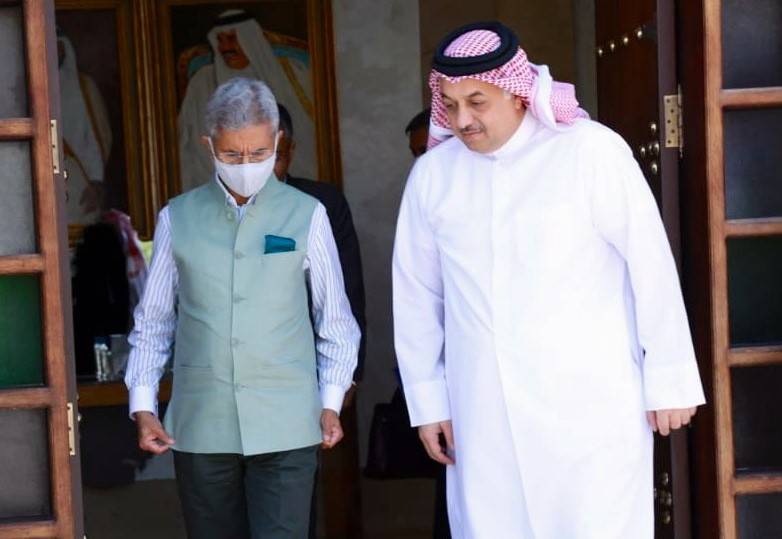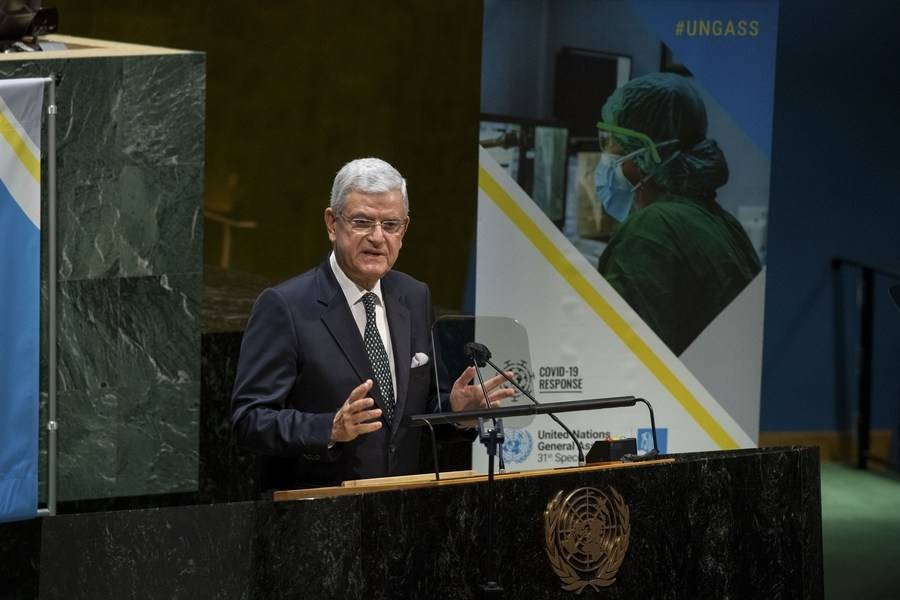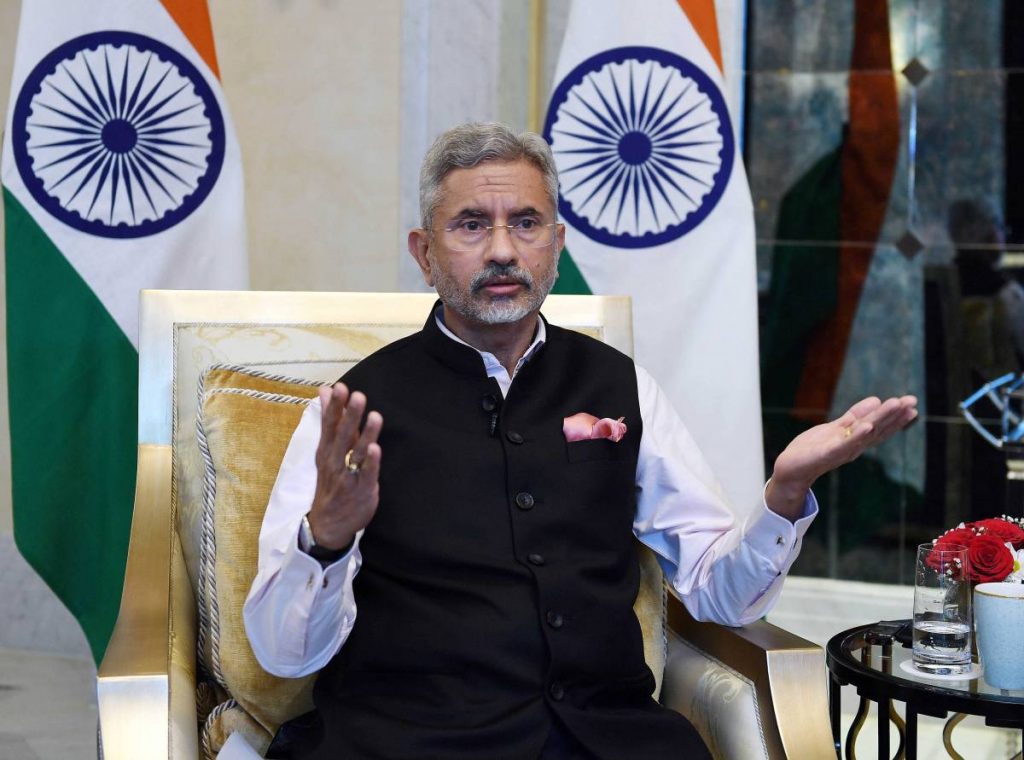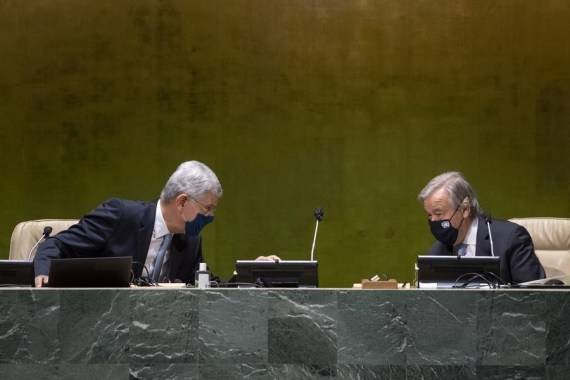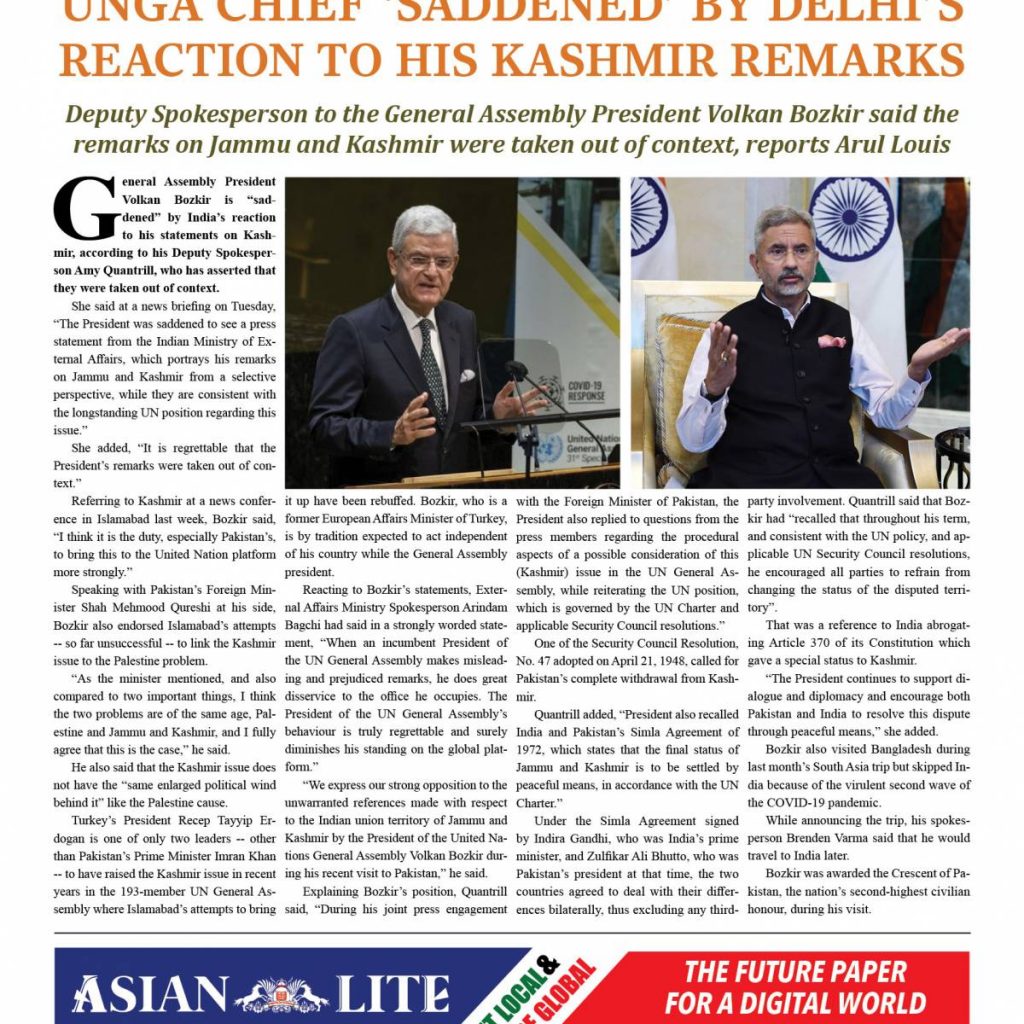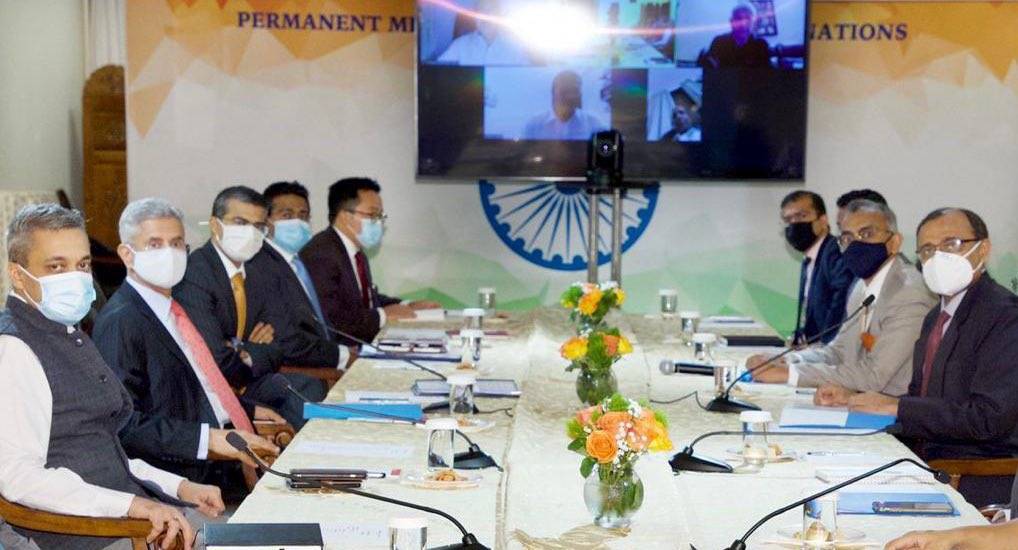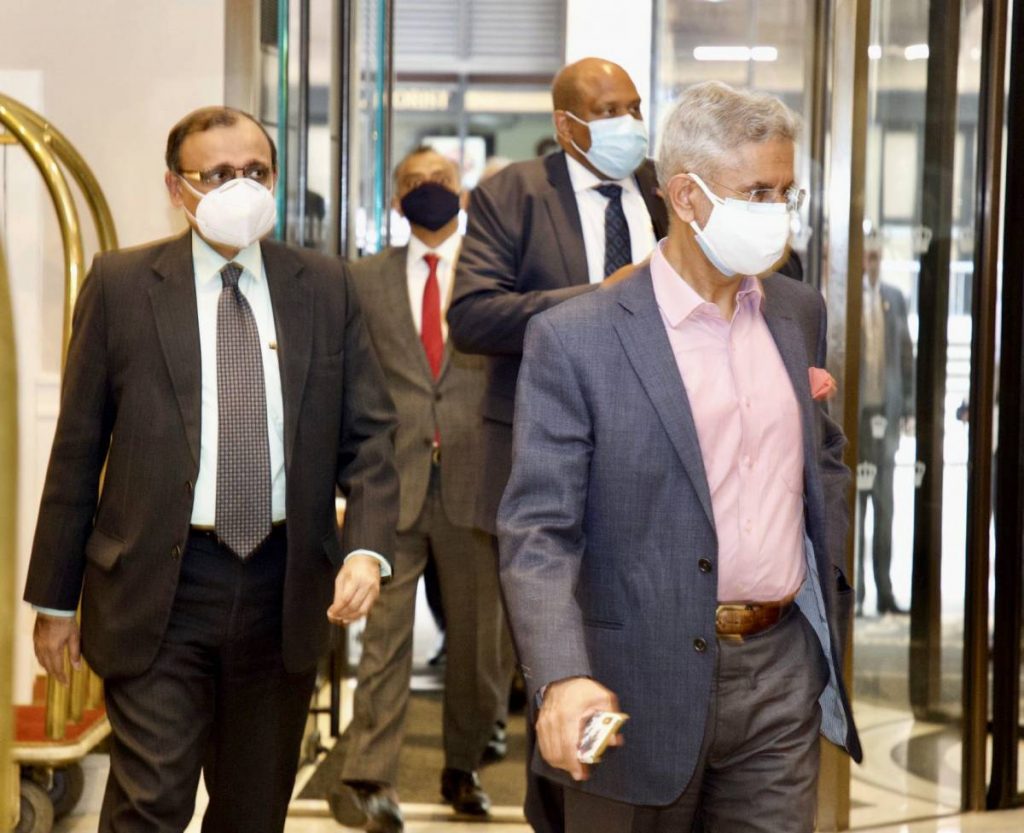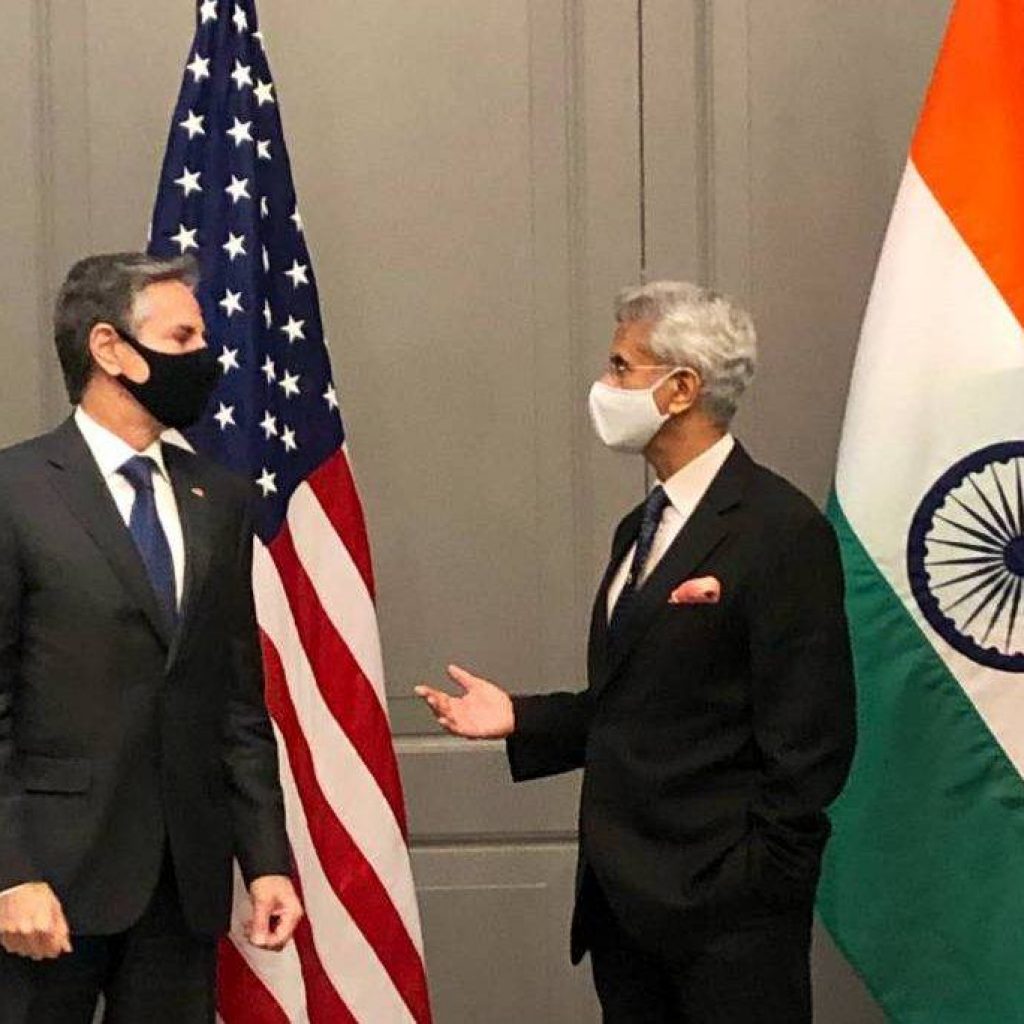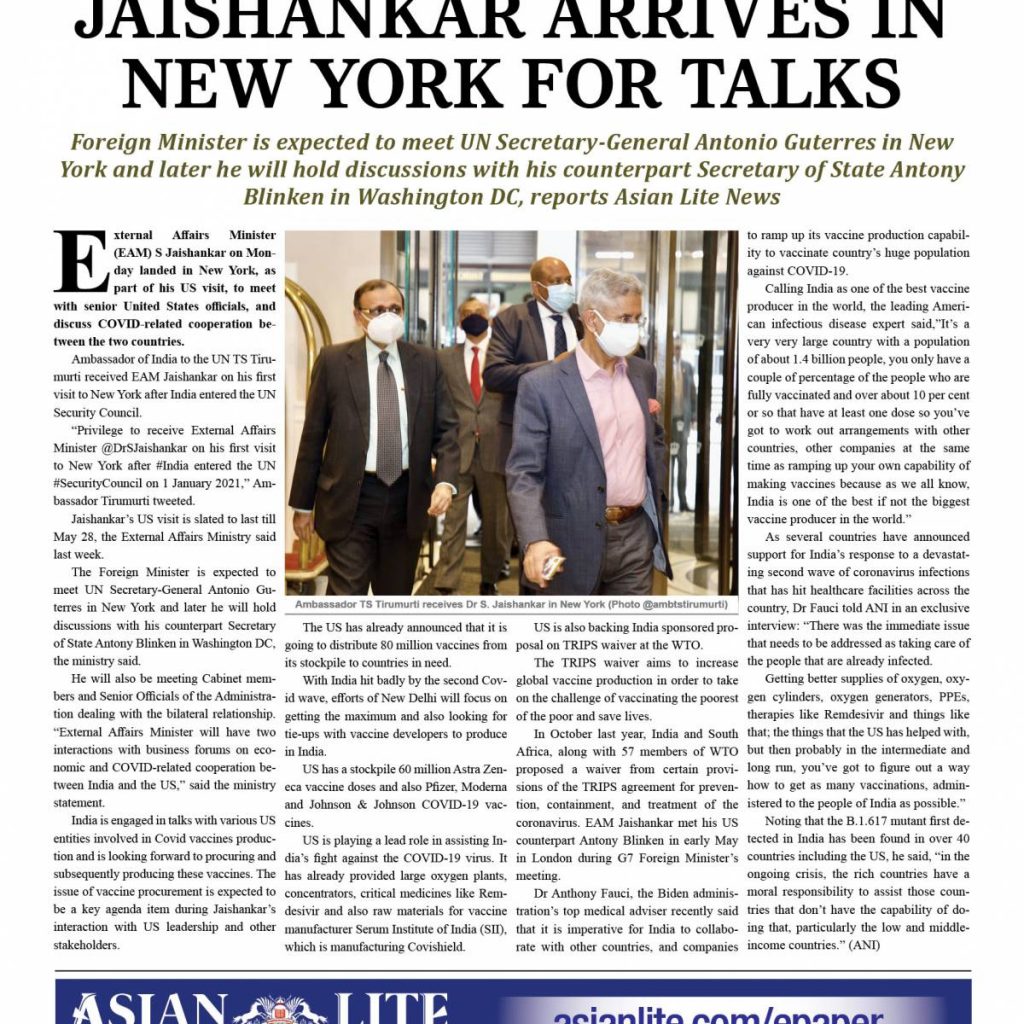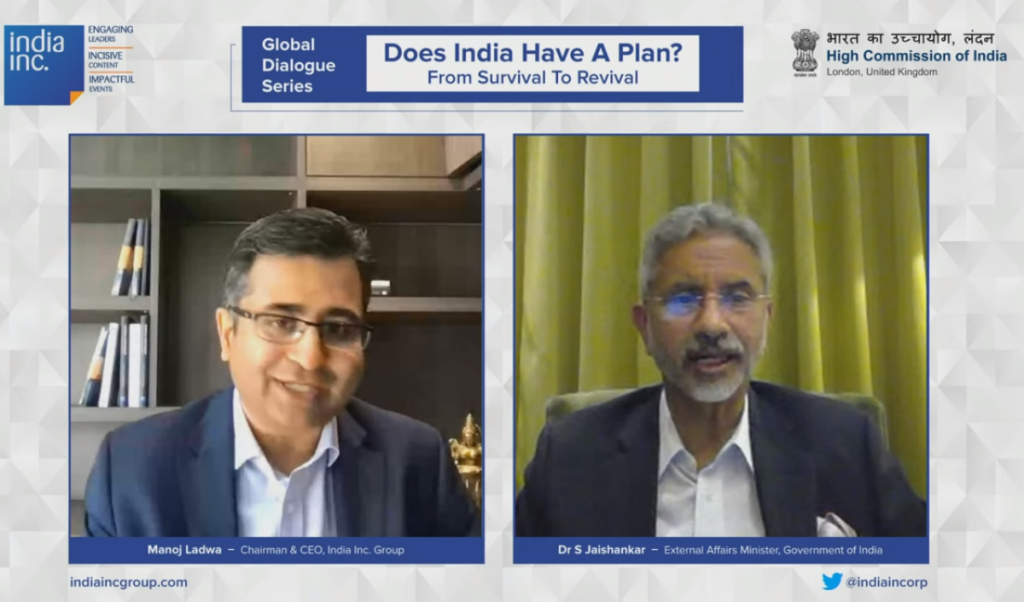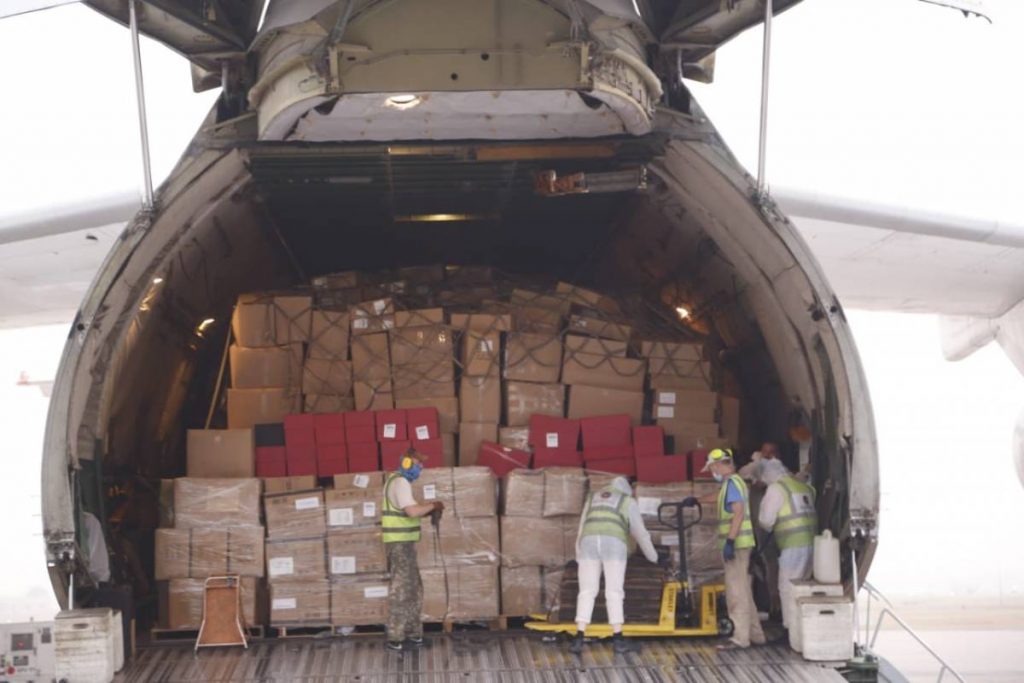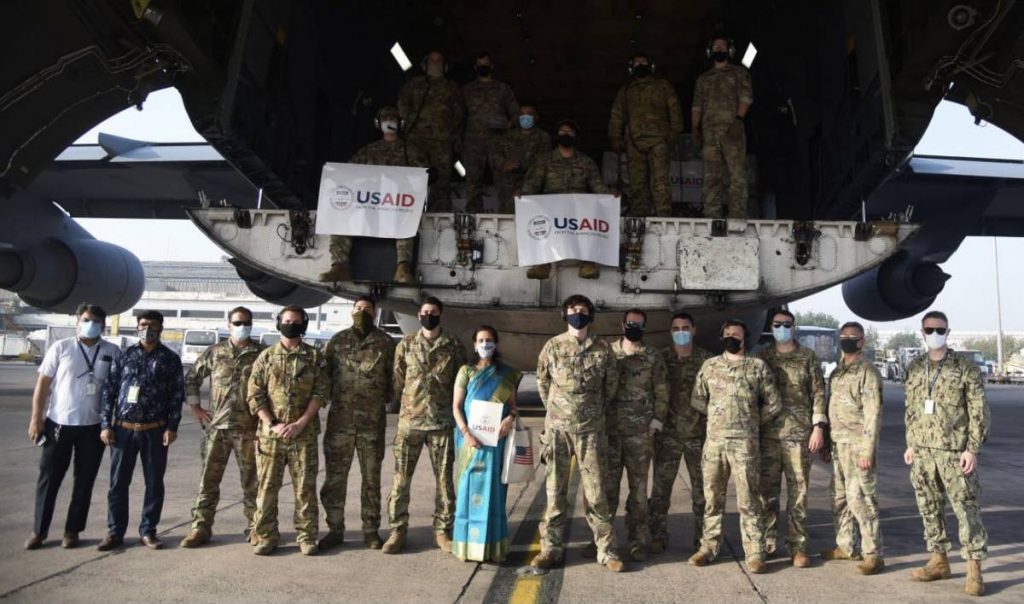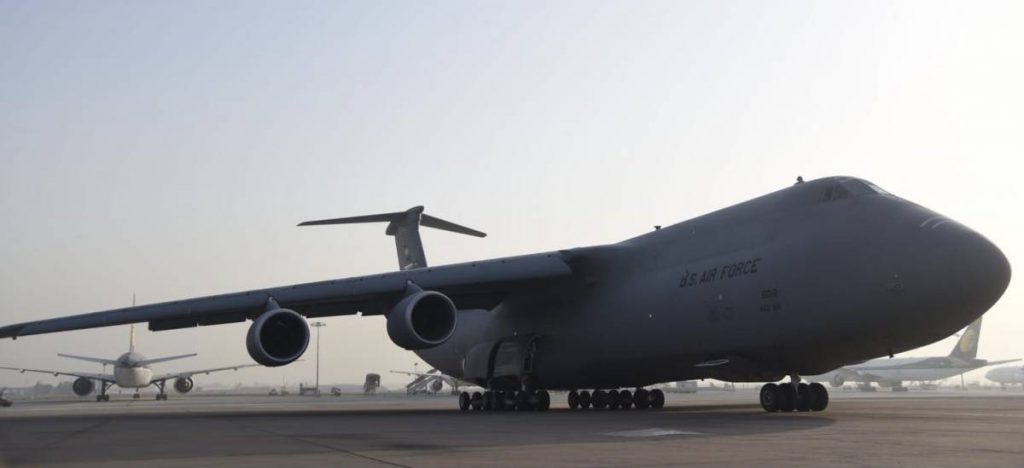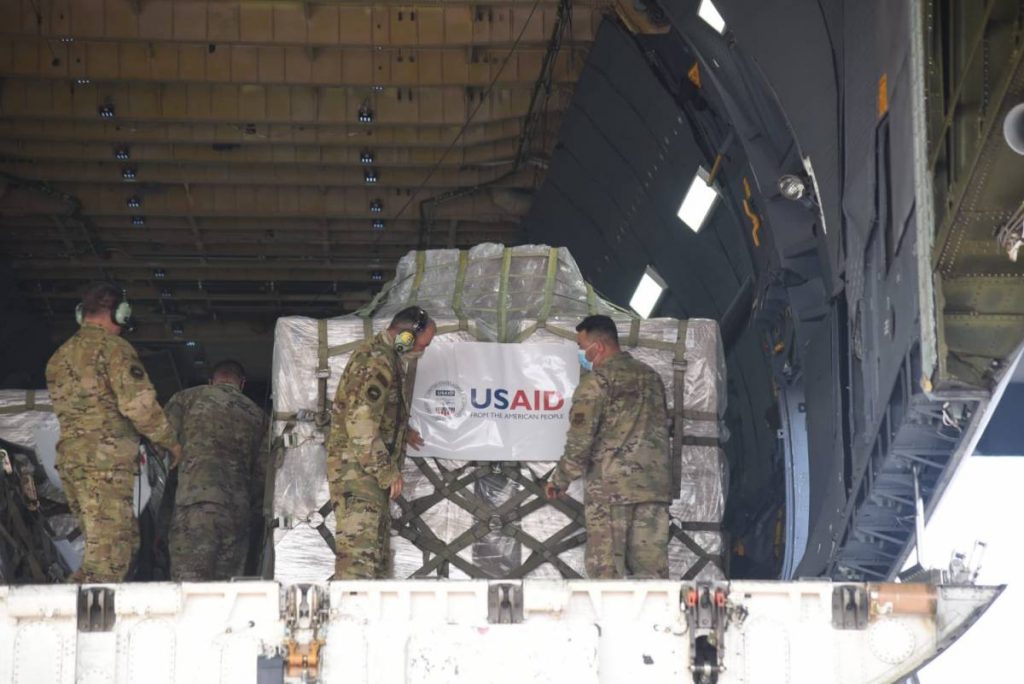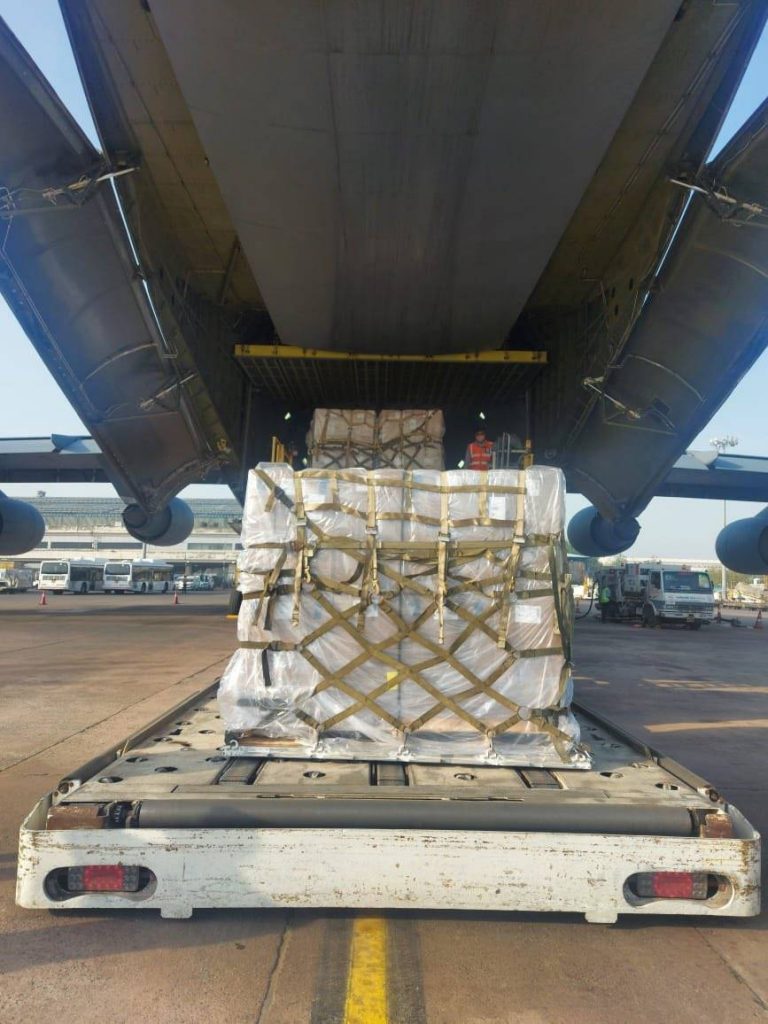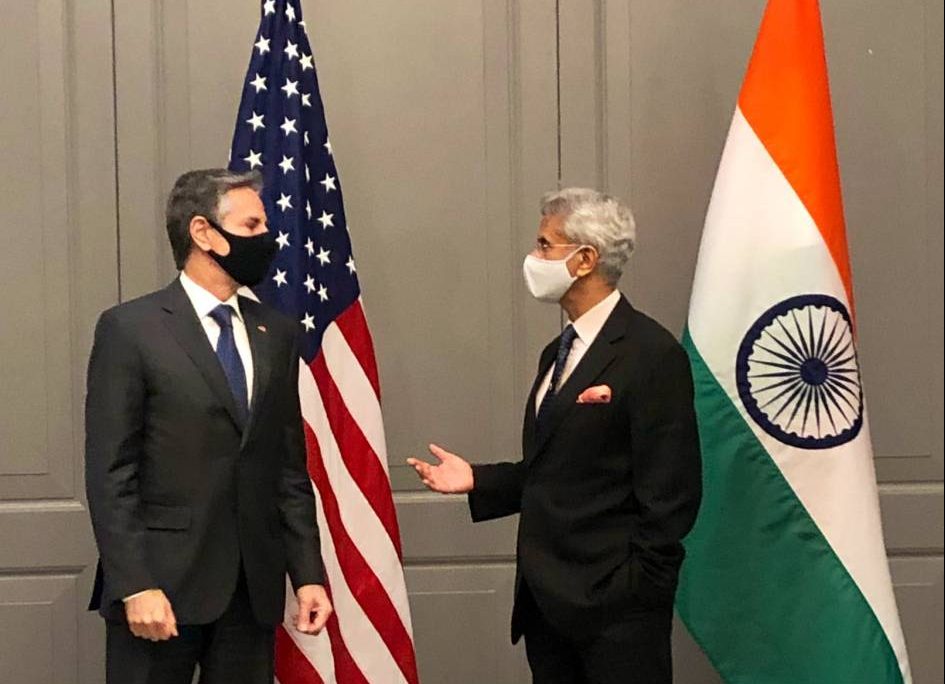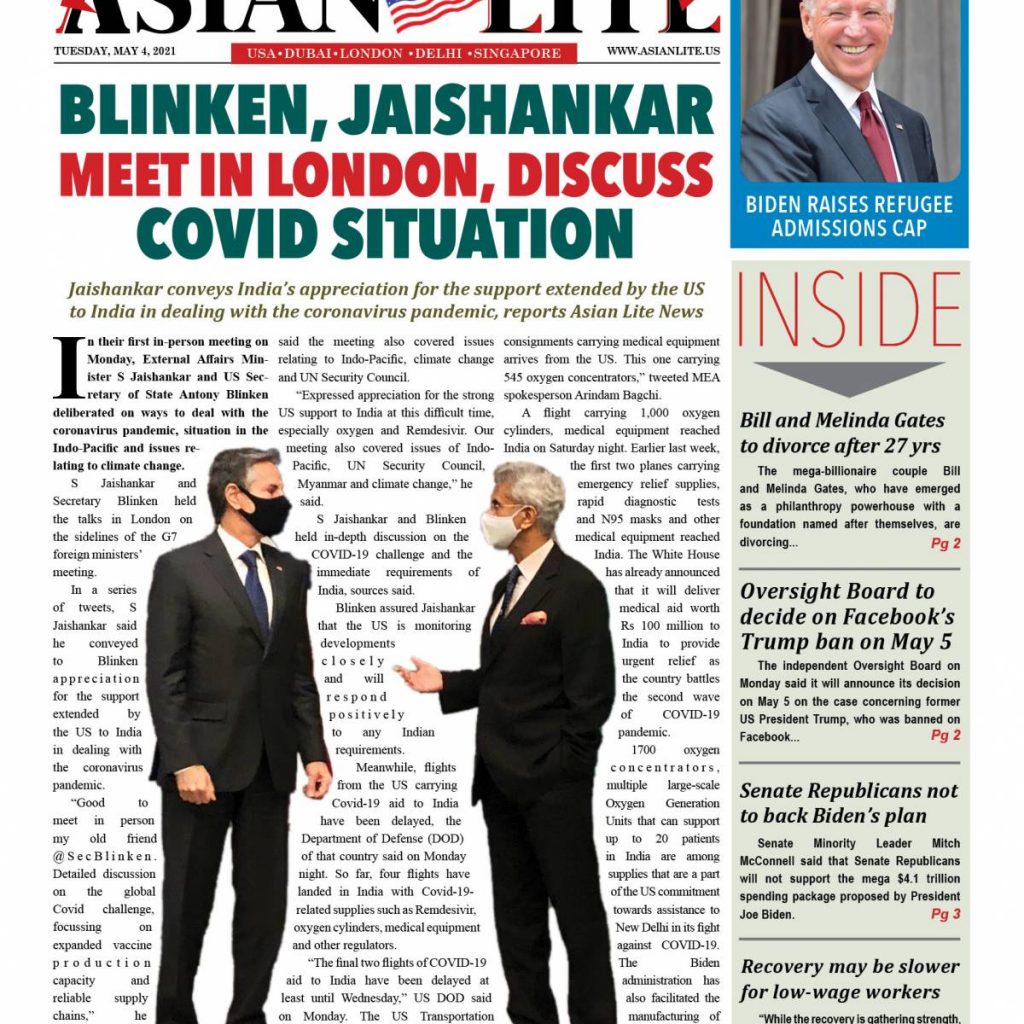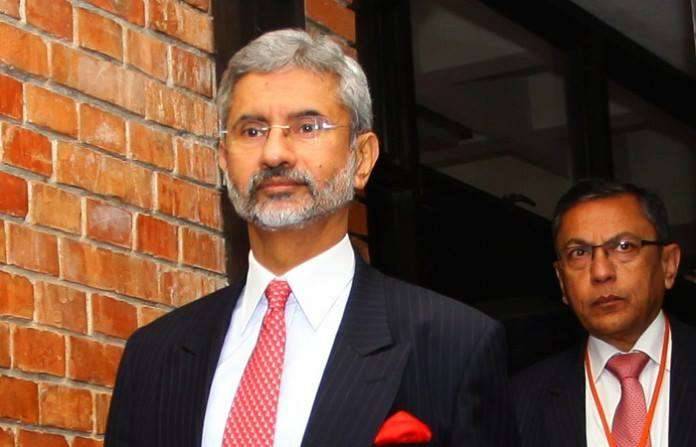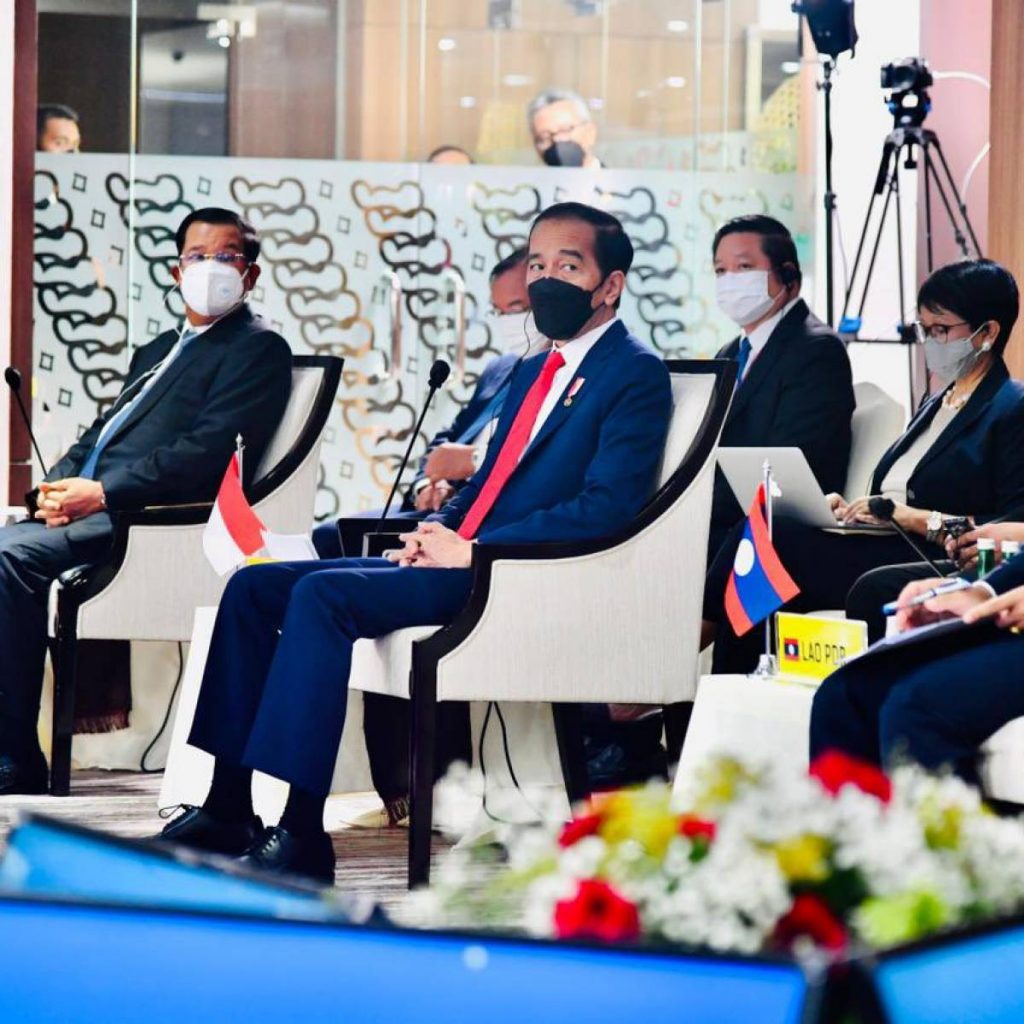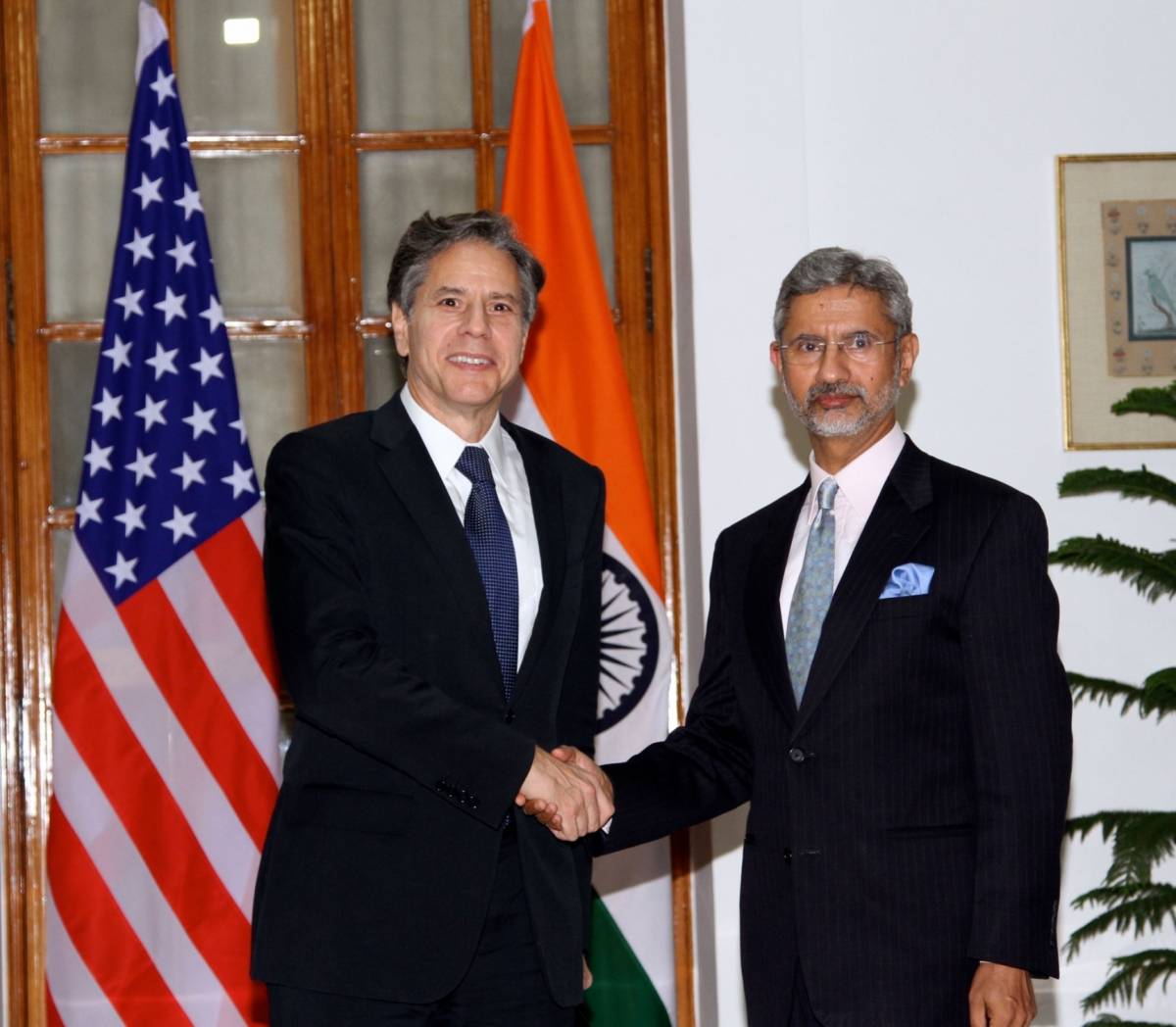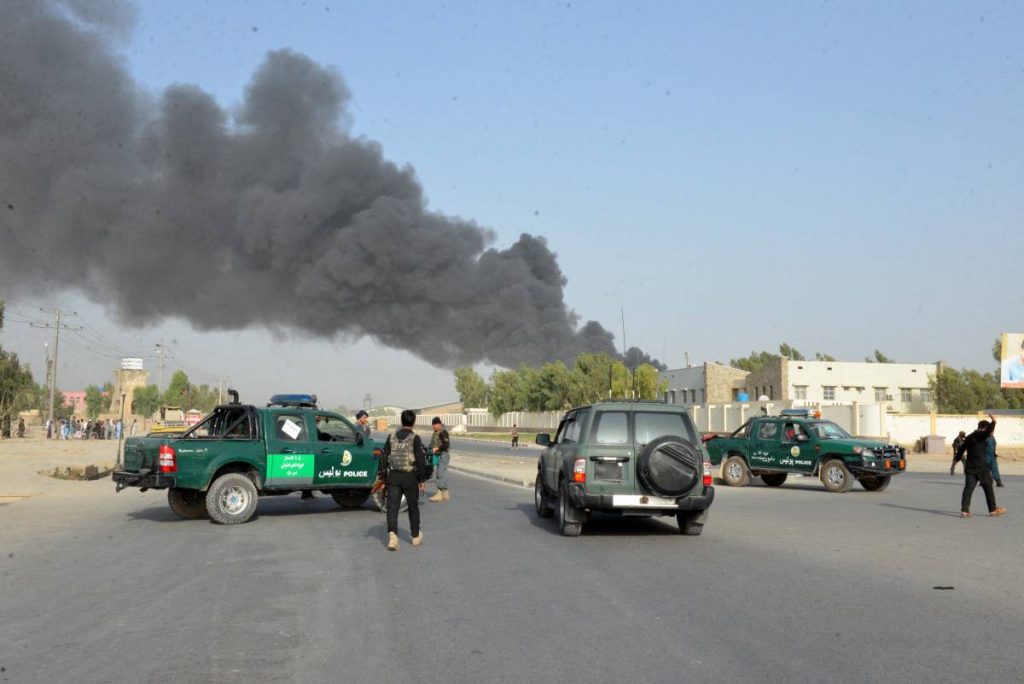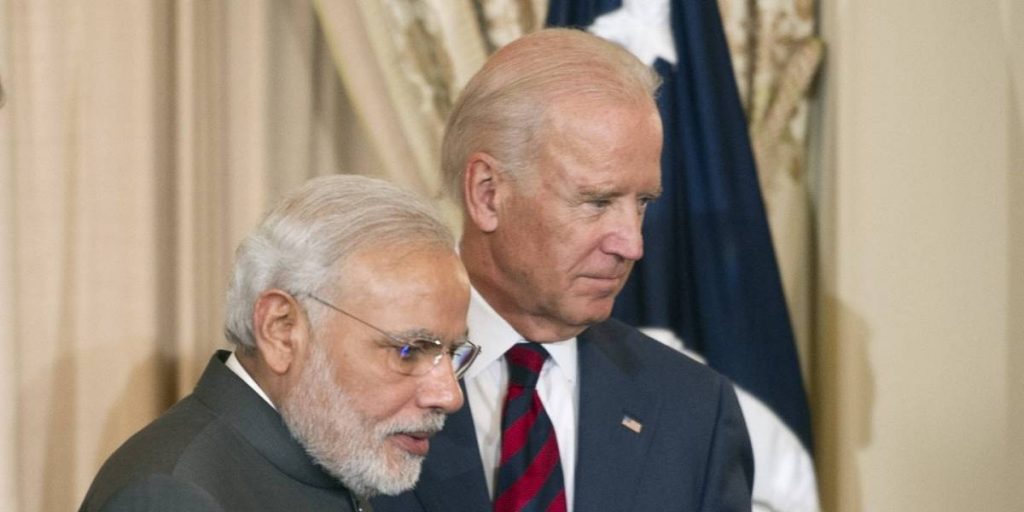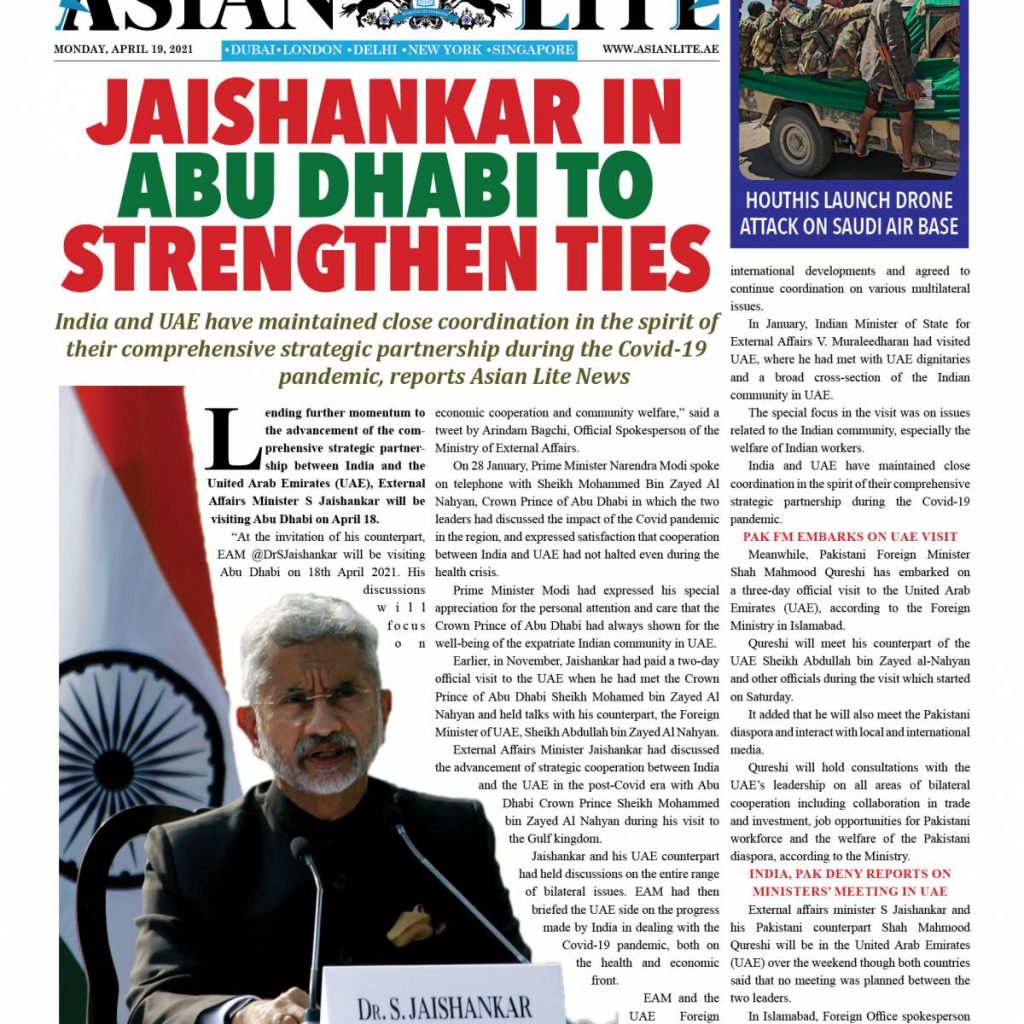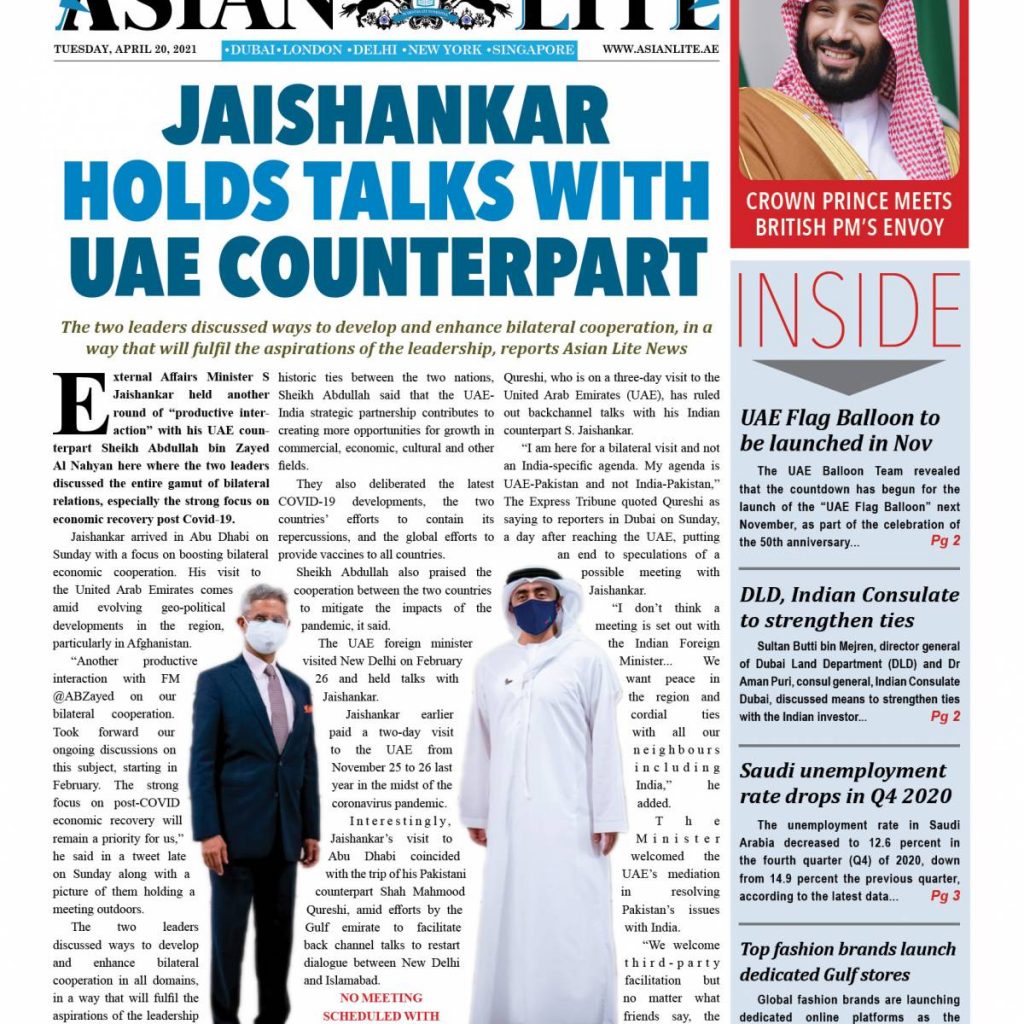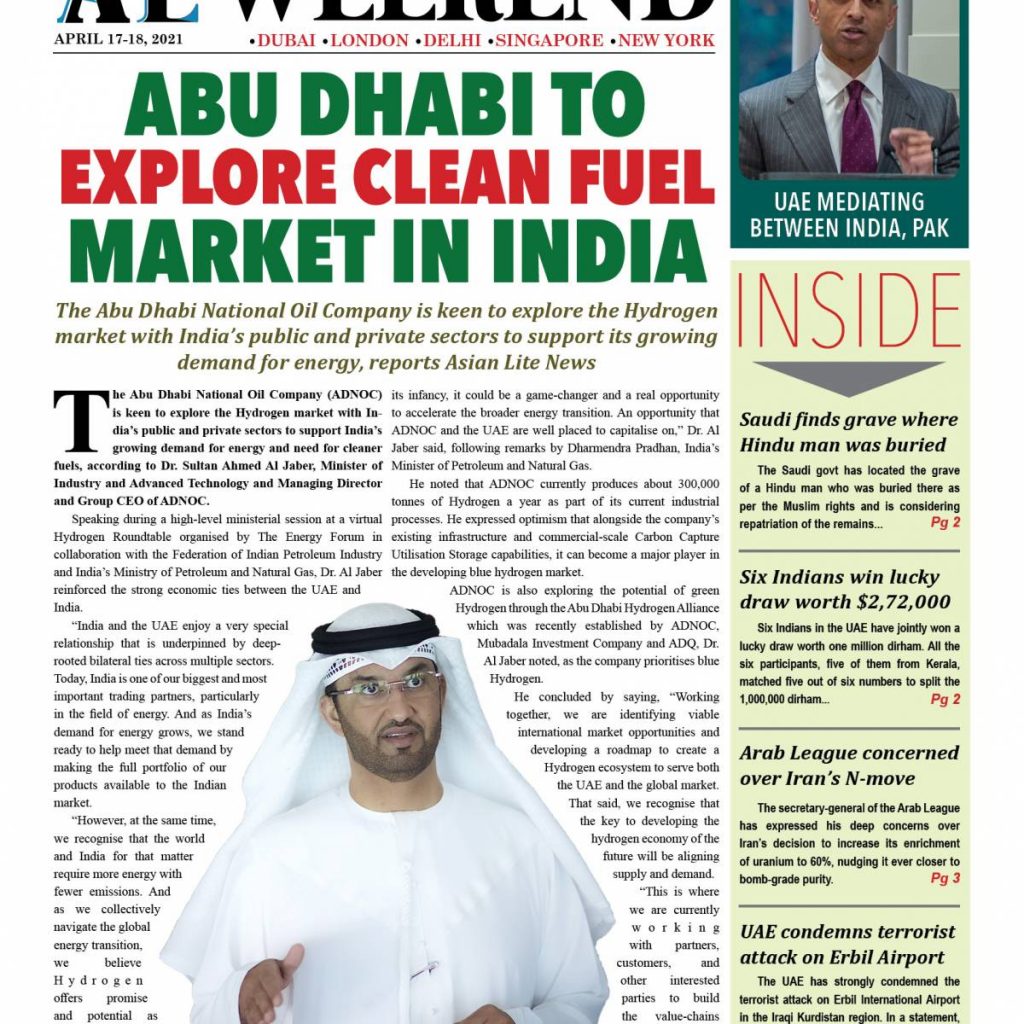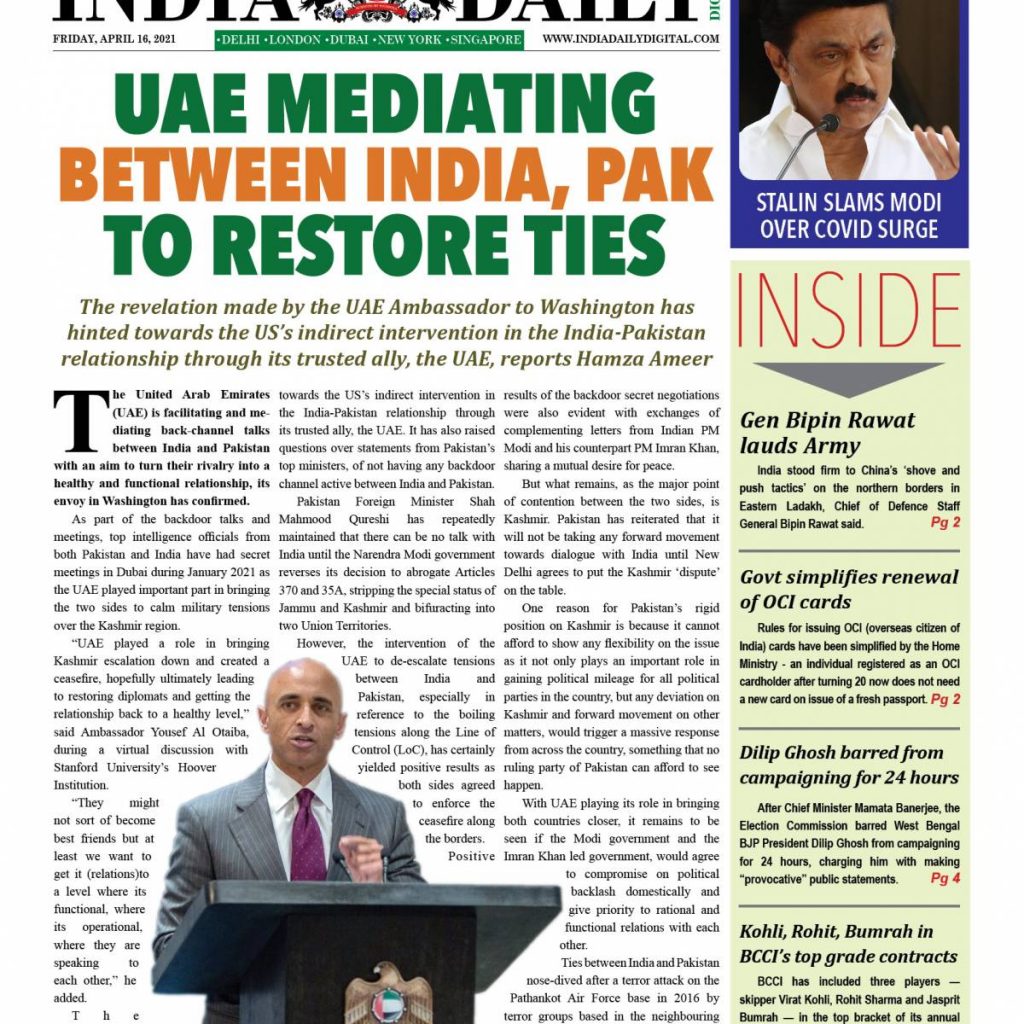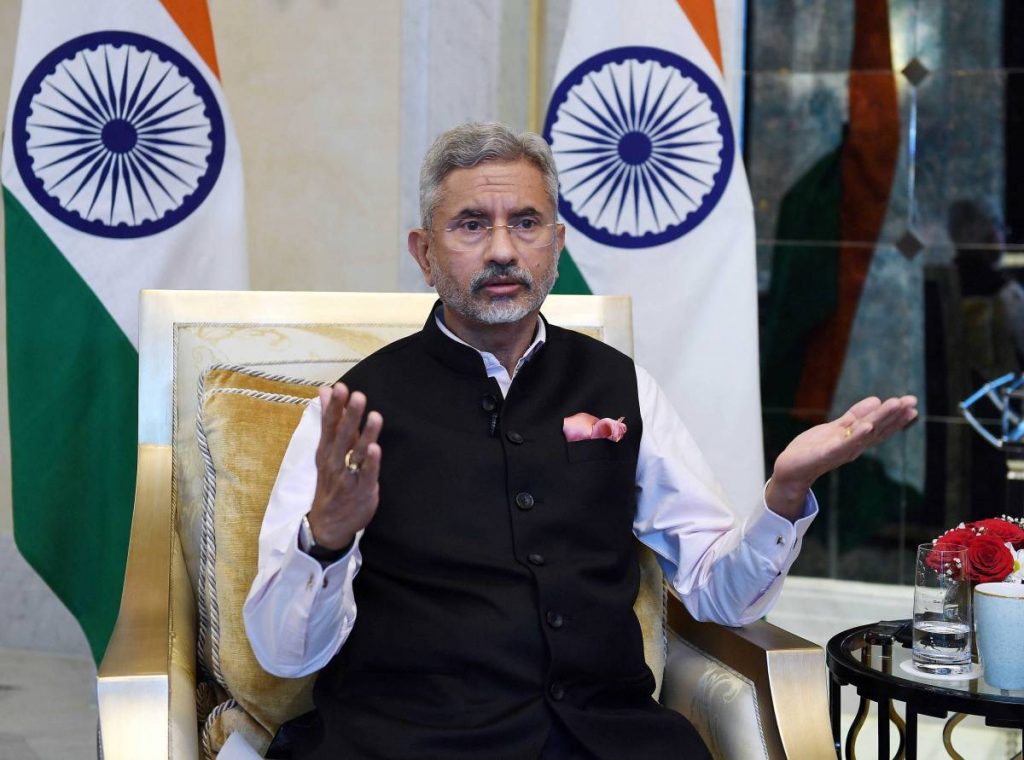India’s External Affairs Minister Dr S Jaishankar addressed an event organised by Public Affairs Forum of India. The theme of the event was “India’s Foreign Policy in the Post-Covid World: New Vulnerabilities, New Opportunities.”
The minister spoke of the dimensions along which perceptions and calculations of nations have changed. These include: trust and transparency; heightened risk aversion; the awareness that global scale capacities are needed to deal with pandemic scale challenges; and decentralization and de-risking of globalization. Extracts from his speech:
We meet in the shadow of the pandemic that has changed the course of contemporary history. It has been a period of extraordinary stresses and shocks. We have been affected by an exceptionally severe second wave. It has abated but not yet gone. We have dealt with unprecedented economic stress; experienced severe social disruptions and distress; and have been dealing with the unknown and the uncertain in this period.
ALSO READ – Jaishankar meets Jordanian, Palestinian counterparts
We have had to deal with the disruption caused by the pandemic in different sectors. However, as the Prime Minister said earlier this week, “disruption does not have to mean despair. Instead, we must keep the focus on the twin foundations of repair and prepare.” In the last one year, we have seen a great collective effort to overcome the challenges that we are facing. Our scientists have produced vaccines and know more about the virus and the dangers that it poses. Businesses have adapted; economic and logistical systems have withstood extreme stress; and technology has enabled creation of new paradigms in education, social equations and commerce.

At a broader diplomatic level we have a keener awareness of the uncertainty that pervades the entire global system. The uncertainty has altered geopolitical and geo-economic conduct.
Confidence in globalization has taken a hit. What is often termed as the “global system” for lack of a better word is seen as inadequate to the challenges posed by the pandemic. In fact, to some, globalization has become a part of the problem. It is seen as a vulnerability.
ALSO READ – Jaishankar meets Qatar NSA, thanks for support to India
One particular element of the globalized world, global value chains and supply chains, has acquired prominence not just in business circles but also at the political level. There is a general belief that these chains may have caused dependencies.
These new vulnerabilities and challenges have altered the diplomatic environment. We often hear that the pandemic has accelerated already visible trends. Even before the pandemic struck, we were a part of an increasingly more complex and globalized international system with many moving parts.
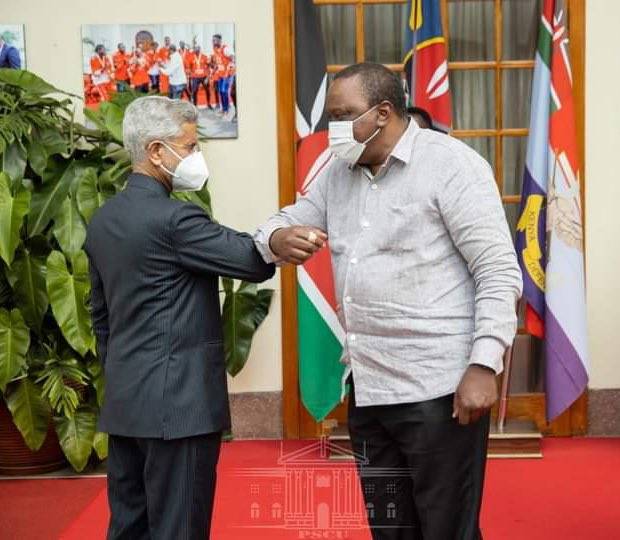
It is also a system that is in rapid transition. Diplomacy has traditionally been about control over territory, populations and resources. These were the determinants of national power. Science and technology and the industrial revolution introduced economic factors such as markets and finance into foreign policy calculations. Geo-economics intersected with Geo-politics. This combination, and the Cold War divide, drove much of diplomacy after World War II. The fall of the Berlin War settled the Cold War.
The digital revolution and new technologies have added a new axis of geo-technology to the intersection of geo-politics and geo-economics. National power today is more about technology and about systems and processes rather than territory.
We also inhabit a world in which centres of diplomatic gravity are in very rapid transition. For the first time in centuries, Asia is beginning to drive the global economy. Politically, the bipolar order that prevailed during the Cold War gave way to a unipolar system following collapse of the USSR. A further transition is underway as this unipolar world order moves to a multipolar system.
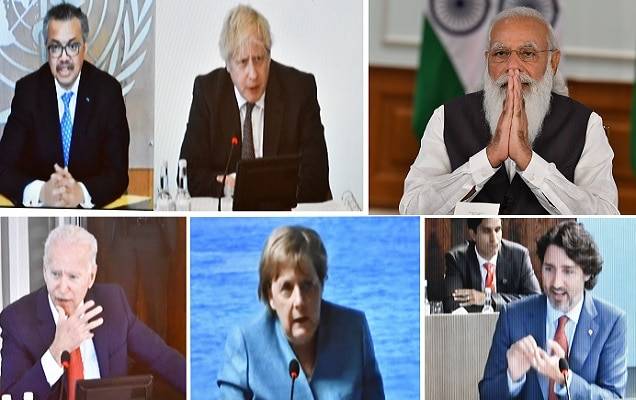
The rise of China has also placed us in a central role at the geopolitical stage. It is our largest neighbour and one with which we share more than just a border and proximity. We have also had to confront a specific strategic challenge posed by China and its tactics on our shared border.
Completely new threats and security challenges such as terrorism, climate change and biological and other non-traditional threats have emerged and continue to emerge. New technologies have created both new industries and new political currents. Non-traditional threats and new technologies have combined to form a whole new spectrum of sub-conventional security challenges.
ALSO READ – ‘Quad fills the gap in contemporary times’: Jaishankar
As a Ministry we are thus faced with a rapidly changing geo-political and geo-economic environment even as we cope with very complicated tactical requirements. A pandemic of this nature, as we have all realised, requires not just a whole-of-government approach but a whole-of-society approach. It also requires us to source solutions and capacities on a global basis.
The Ministry of External Affairs, like the entire Government of India, adapted to respond to the new realities of the pandemic. Our Ministry created a de novo vertical, the COVID Cell that worked 24 x 7 to coordinate our COVID related operations. This was resourced appropriately with some of our best officers and was able to scale up rapidly on demand.
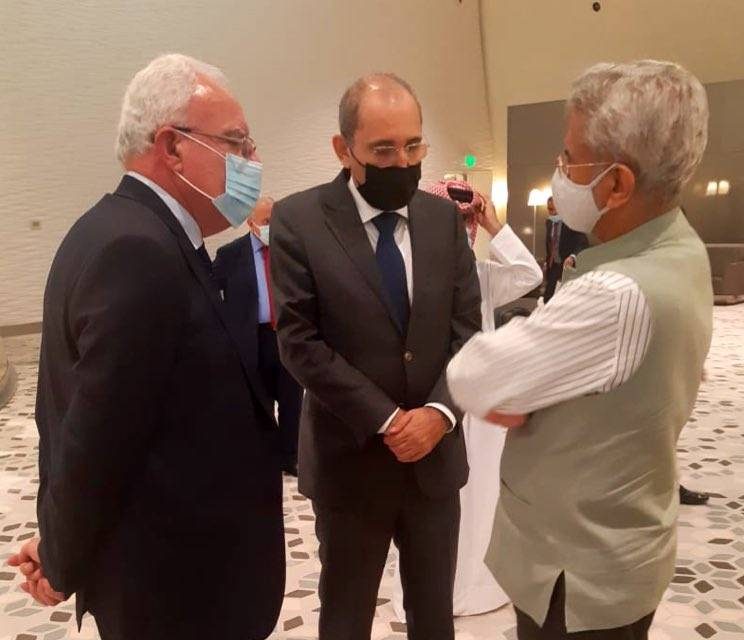
Our network of diplomatic Missions played a key role in organizing the Vande Bharat Mission, the largest logistical mission of its type ever undertaken. This has facilitated the movement of more than seven million people through lockdown and post-lockdown periods.
Indian HADR operations, which are complex inter-agency operations requiring detailed planning and efficient execution, acquired global dimensions with the deployment Rapid Response Teams to Maldives, Kuwait, Mauritius and Comoros and with Mission SAGAR to Maldives, Mauritius, Madagascar, Comoros and Seychelles. India also supplied healthcare products to over 150 countries in the face of daunting logistical challenges.
MEA has acted as the global arm of the Government of India’s Empowered Group system to procure essential medical supplies for COVID-19. We have, throughout the pandemic, identified and connected with potential suppliers of essential medical equipment across the world.
During the first COVID wave last year, a global sourcing operation was launched to procure ventilators, PPE kits, N95 masks, 3-ply surgical masks and testing kits. These helped us to tide over the situation till domestic manufacturing scaled up to meet demand.
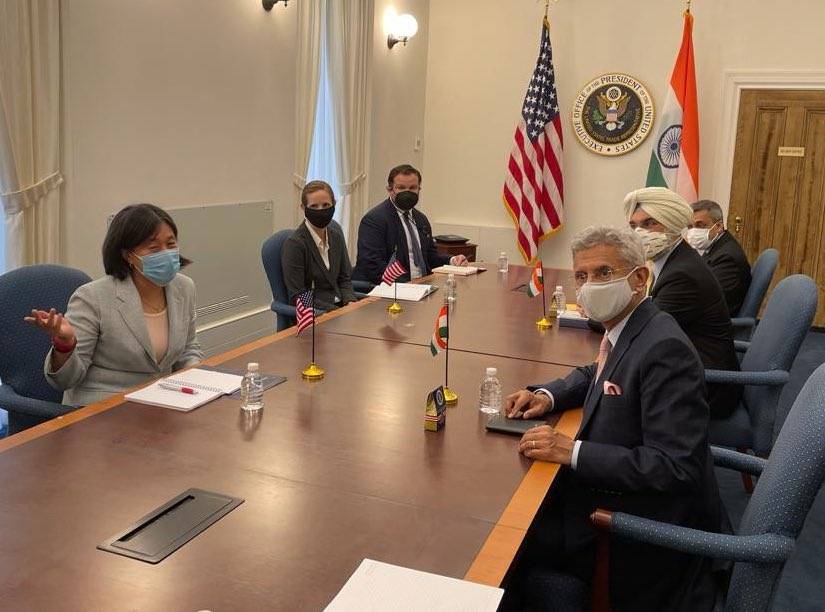
We also intervened to source medical products, machinery, and components that were vital for enhancing our domestic manufacturing capabilities. MEA facilitated the import of components for ventilators, testing inputs such as RNA Extraction Kits, Roche Cobas testing machines and testing kits from the US, Germany, China, Switzerland and Singapore.
Our Missions abroad, where required, also reached out to original suppliers in various countries to expedite shipments of critical items. This effort to procure essential medical supplies intensified during the second wave. We worked closely with other Ministries and agencies, our Armed Forces and State governments, during the massive procurement and logistical operation to secure supplies of critical items.
The immediate need during the second wave was to ramp up oxygen supply in thousands of hospitals spread across India. One of the challenges was to transport medical oxygen to the places of need from distant places of production within India. MEA and our diplomatic Missions reached out to suppliers and Governments and arranged cryogenic tankers, which helped with quick transportation of medical oxygen in the country. Our Missions in the Gulf countries worked with the Indian Navy for the supply of medical oxygen from those countries. Our Missions worked with the Indian Air Force in arranging the airlift of cryogenic tankers from Singapore, Thailand and other South East Asian countries. We also facilitated the supply of oxygen plants, large number of oxygen cylinders and concentrators from Governments and private organizations.
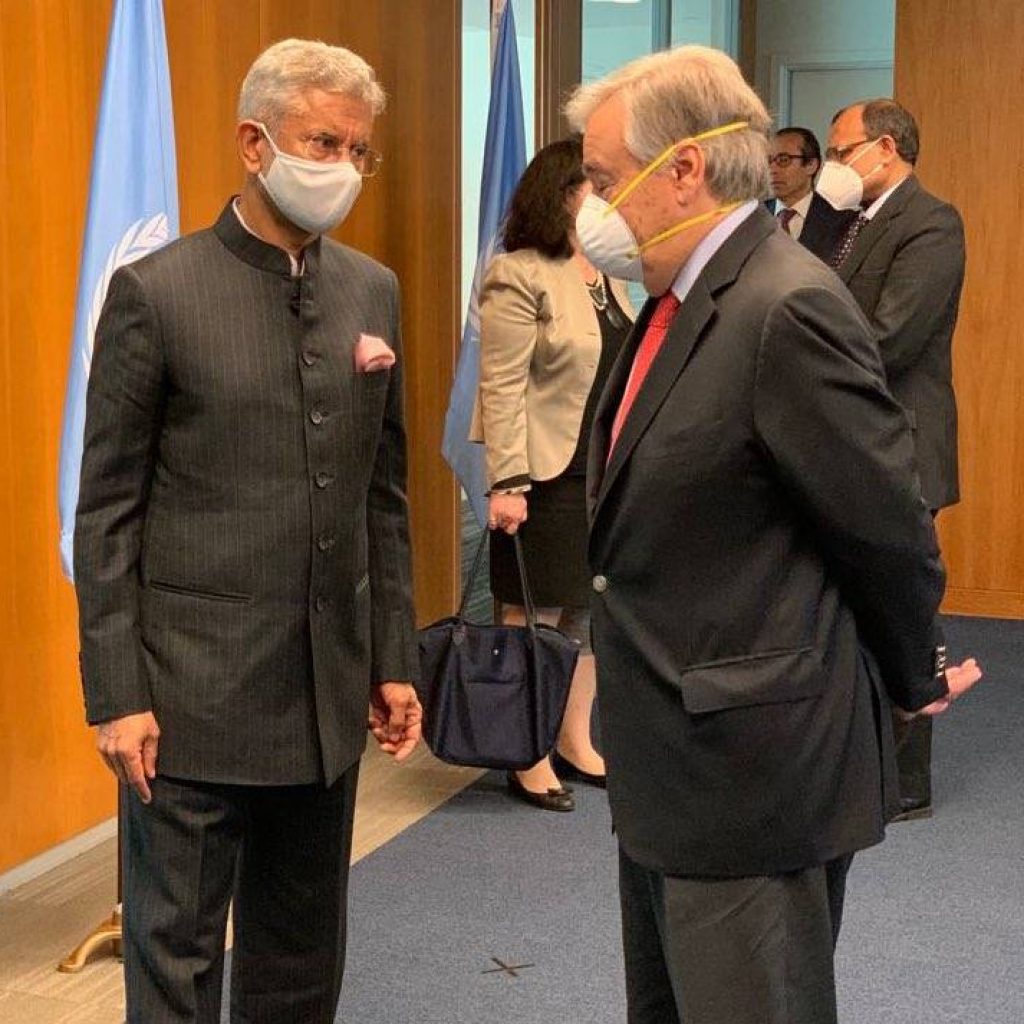
We facilitated procurement of critical drugs such as Remdesivir, Tocilizumab, Favipiravir and Liposomal Amphotericin-B. When demand for Remdesivir shot up in the country, we had to ensure that our domestic manufacturing capacity for this vital drug was significantly augmented. This required enhanced supplies of raw materials which were facilitated by our Missions from diverse locations such as the US, Europe and China. Another example is the case of Tocilizumab which is not currently manufactured in India. Roche Pharma, Switzerland is the sole supplier of the drug. We reached out to the leadership of the company and, through consistent efforts, supply to India increased significantly over the last year. We also scouted for alternate sources and were able to get supplies through foreign assistance. We were also able to secure supplies of antibody cocktails from Roche.
Another important aspect of our efforts was to facilitate supplies of essential raw material and components. For instance, CSIR, DRDO and several of their industry partners were provided assistance in procuring zeolite molecular sieves, which is a critical component of oxygen generators and plants.
India received extensive support and assistance from its partner countries around the world during the second wave. This reflected the goodwill earned by India for the assistance extended by it to other countries when they needed it. The COVID cell within MEA handled the complexities associated with the delivery of foreign support. In close collaboration with other stakeholders in the Government of India and State Governments, the cell facilitated the arrival and distribution of critical items such as medical oxygen, oxygen cylinders and concentrators, oxygen plants, medicines and other equipment received from our partner countries.

Our Embassies in Russia and USA facilitated discussions with major vaccine manufacturers about procurement and possible local manufacturing of their vaccines. For example, we have been involved in the introduction of Sputnik-V into India.
Vaccines have complex supply chains. We have worked to ease regulatory disruptions to these supply chains by diplomatic interventions with some of our key partners. We have adapted rapidly to virtual diplomacy. Our high level engagements at the bilateral, plurilateral and multilateral levels have continued in the virtual mode. In recent months, the Prime Minister has participated in the G7 Summit; India-EU Leaders’ meeting; first Quad Summit; and Leaders’ Summit on Climate. These engagements have been accompanied by regular virtual and telephonic conversations with leaders of partner countries, including the US, Russia, UK and Japan.
Indian diplomacy as you can see is adjusting to this complex and uncertain environment. It is doing so with agility and flexibility. We have to think and act innovatively and to adapt at the conceptual and operational levels.
The challenge before us is to create capacities to deal with unexpected and catastrophic events. We have to be able to repurpose organisations at very short notice to deal with unexpected challenges. Existing hierarchies and structures are often unable to cope with such challenges and may require re-engineering.
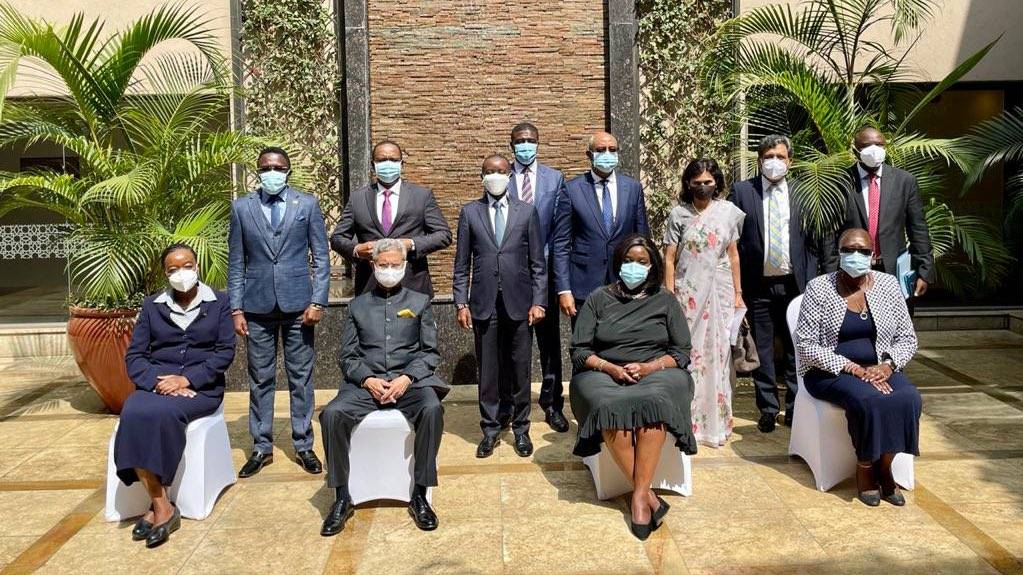
The larger diplomatic operating environment has become immeasurably more complex. Diplomatic calculations earlier were made on the basis of ideological binaries or fairly straightforward balance of power equations.
Today’s environment is highly complex, multi-layered and multi-dimensional. Binaries and simple equations have been, to use an analogy, replaced by complicated algorithms. We must, in an environment such as this, build the capacities that allow us to maintain decisional autonomy.
We must focus on acquiring a leadership role that allows us to both participate in and contribute to the emerging world order. We must deepen cooperation with old partners and allies. We must at the same time forge new partnerships with rising powers.
We must have a dynamic and proactive global strategy in a multipolar world that adjusts to alliances and convergences that are fluid and issue based. We must engage simultaneously with multiple centers of gravity and capacities in an extremely complex and fast-moving global scenario.
This is also a time of opportunity. Empirically speaking, all crises are succeeded by periods of growth. The Great Depression and the Second World War were followed by one of the greatest sustained spurts of economic growth. A similar trend was observed after all the four major recessions in the post-World War II era. Major health crises have led to investments in medical science and public health that have transformed our lives.
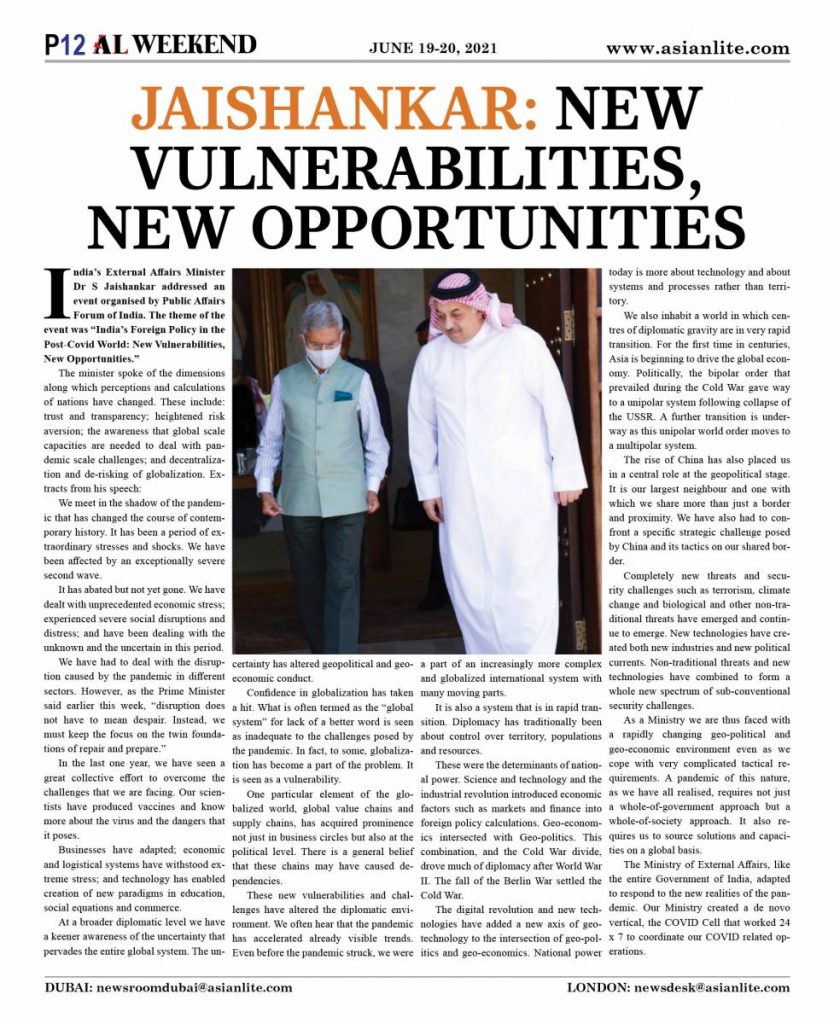
FDI inflows into India during the last pandemic ravaged year were the highest ever at US$ 81 billion. India is home to one of the world’s largest start-up eco systems. Several unicorns have come up in the recent years.
The world has gone online. This present interaction between us, workplaces, public institutions like courts, educational institutions, social events have moved all of us to a virtual space. Virtual reality, augmented reality and other such technologies will further transform our lives and the manner in which we work and interact with each other.
I would like to focus on three specific areas where India, at this point, to use business terminology, has a value proposition. The first is the opportunity created by the ongoing transition to a knowledge economy. Output in such an economy will be driven as much by new technologies and digital processes as it is driven by agriculture and goods and services.
The transition to the virtual world that I referred to above points towards not just transformation, but a very rapid transformation. New and emerging technologies such as Blockchain, Artificial Intelligence, Quantum computing, advanced materials, advanced manufacturing, genetics and biotechnology will create new superpowers. We are already aware of the power of data. A country like India with its emphasis on education and innovation is well placed to take advantage of this transformation.
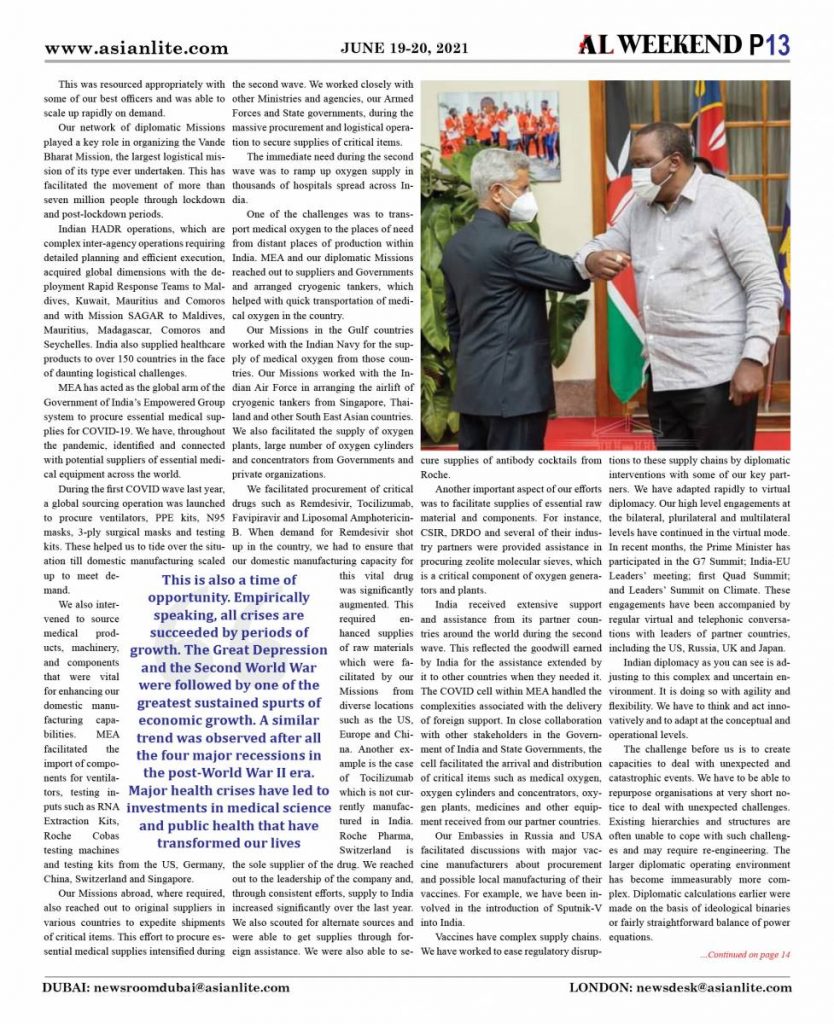
The second opportunity will arise due to the requirement of de-risking and diversifying supply chains. I have spoken earlier of the requirement for trust and transparency. Businesses are trying to create secure and stable supply chains that will be able to deal with pandemic level shocks. A number of conversations, such as the joint India-Australia-Japan Supply Chain Resilience Initiative, are taking place. The first Quad Leaders Virtual Summit in March discussed supply chain resilience.
A third area of opportunity is in Climate. Climate change is one of the defining challenges of our time. India is amongst the front rank of nations with climate ambition. Despite our development challenges, we have taken major initiatives in the areas of clean energy, energy efficiency, afforestation and bio-diversity.
India will not just meet its Paris commitment targets but exceed them. According to Climate Action Tracker, India is the only G20 country with “2°C compatible” targets. The Climate Change Performance Index 2021, that tracks climate protection performance, ranks India as a high performing country.
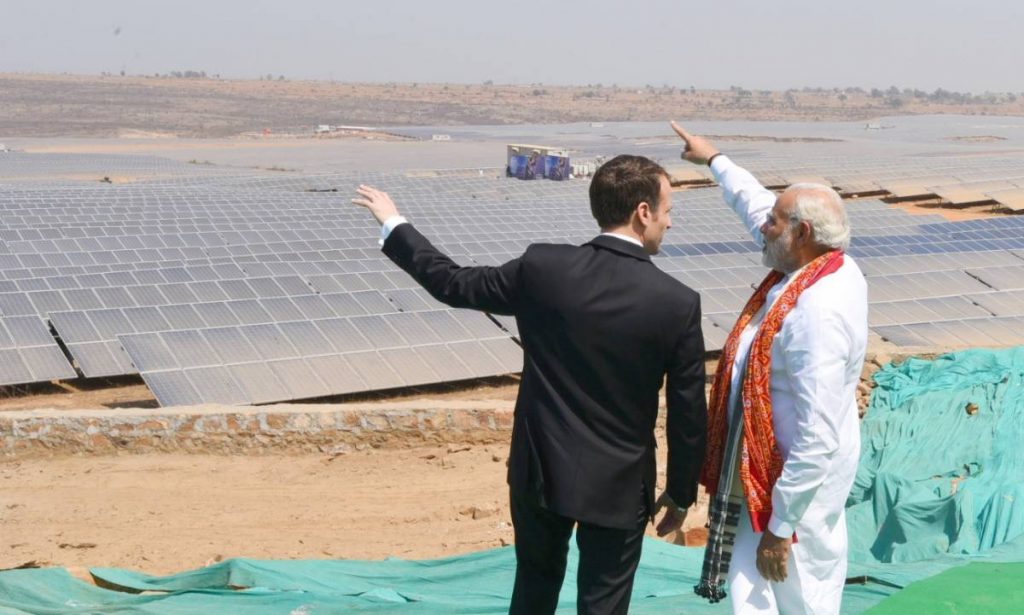
Energy is at the centre of India’s ambition and agenda. Massive investments have been made in augmenting India’s renewable power capacity. Twenty-four per cent of India’s installed capacity comes from renewable sources such as the sun, wind, bio sources and small hydro projects. In absolute terms, India ranks within the top five globally when it comes to power generation from these renewable sources. India has, according to the International Renewable Energy Agency, installed solar power capacity at a faster rate than that of the US, US, and China in the last five years. We have set an ambitious renewable energy target of 450 Gigawatts by 2030.
We take the issue of land degradation seriously. We are working towards restoring 26 million hectares of degraded land by 2030. This would contribute to India’s commitment to achieve an additional carbon sink of 2.5 to 3 billion tonnes of carbon dioxide equivalent. Over the last 10 years, around 3 million hectares of forest cover has been added. This has enhanced the combined forest cover to almost one-fourth of the country’s total area.
The two major global initiatives supported by India – International Solar Alliance and the Coalition for Disaster Resilient Infrastructure – are emerging as useful platforms for cooperative action in the area of climate change. This transition to a climate resilient economy will generate economic output and place the country on a sustainable growth path. A green economy makes for good economics and India is on the path to creating a green economy.
Speaking at the Raisina Dialogue earlier this year, the Prime Minister had said: “the Covid-19 pandemic has presented us an opportunity to reshape the world order, to reorient our thinking. We must create systems that addresses the problems of today and challenges of tomorrow. And we must think of the entire humanity and not merely of those who are on our side of the borders.”
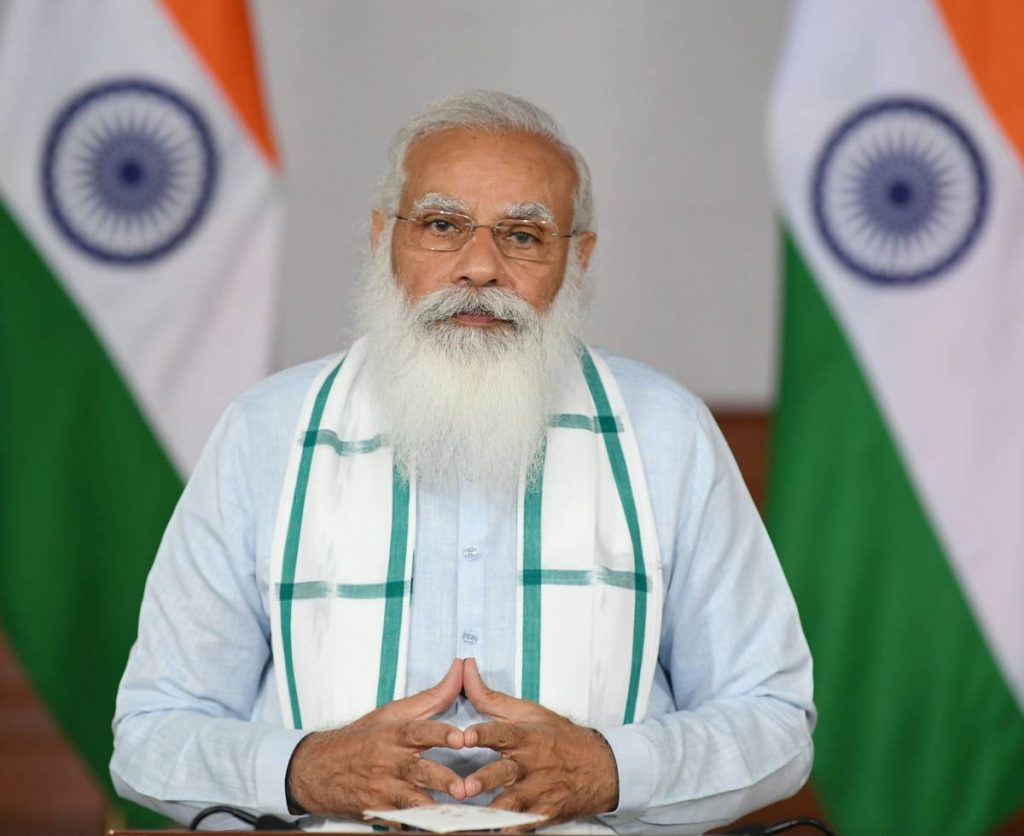
Looking ahead, such principles must inevitably define a post-pandemic world order. India has called for a reformed multilateralism and human-centric globalization. It is a globalization based on fairness, equality and humanity, one that prioritizes our people and our planet, and our collective and sustainable prosperity.
India is a constructive contributor to the efforts to create such an international order by sharing developmental experience with partner countries in the Global South; undertaking humanitarian assistance and disaster relief operations, particularly during the pandemic; through initiatives such as the International Solar Alliance and the Coalition for Disaster Resilient Infrastructure; and by acting as a first responder and net security provider in its diplomatic environment.
ALSO READ – Covid-19 reshaping the world: Jaishankar
